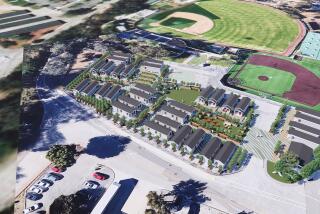Road Project Is End of Line for Mobile Homes
- Share via
Seventy-seven residents of an Oxnard mobile home park will be displaced by a $33.9-million city project to realign Rice Avenue where it intersects with the Ventura Freeway.
The construction, which also will force the relocation of a dozen businesses and two single-family homes, is expected to begin by mid-2003 and take 12 to 18 months to complete, said Cynthia Daniels, Oxnard’s senior project coordinator.
Teresa Galvan, who lives in Owl Mobile Home Park with her husband, Jose, and 6-year-old daughter Anabel, said it is just beginning to sink in that her family will have to move. Jose is a lumberyard employee and 20-year resident of the park. “In reality, we don’t know where we are going,” she said in Spanish. “We don’t know if it will be an apartment, another trailer or what.
“The people in our community want to stay together,” she said. “We are so happy to be close to our jobs and to our schools. It’s not something we want to change. Everybody likes each other.”
But the park residents have agreed to vacate the 18-space park in exchange for financial and relocation assistance from the city.
Federal regulations call for relocated people to be placed within 50 miles of their old homes. But the city has agreed to keep the mobile park residents within five miles of the city limits. The park’s 33 school-aged children will remain in Rio Elementary School District.
“They would like the children to be able to continue in the same school, if possible,” said lawyer Jeannie Barrett of California Rural Legal Assistance, which represents more than half of the residents, who work a variety of low-paying jobs, from farm labor to landscaping.
The city also agreed to provide financial housing assistance to qualified relocated residents beyond the 3 1/2 years that state and federal laws require. Oxnard will hire a consultant to help the displaced residents and businesses.
“It’s pretty much accepted that their mobile homes are too old to be relocated,” Barrett said. Instead, the residents hope to move into another mobile home park, condos or even houses, she said. “Nobody wants an apartment,” Barrett said. “They don’t want to be in the rental market. They’re used to living in this really kind of tranquil environment. They don’t share walls or ceilings with anybody.”
Most residents at Owl Mobile Home Park have lived there for more than 20 years. “We’ve got people who are on their second generation,” said Barrett, adding that some residents have expressed a desire to move somewhere together and continue being neighbors. “That is a big deal to several of them,” she said. “Those tended also to be the people with kids. They essentially have a village raising their children.”
Affected business owners, such as Marie Trujillo of A&M; Roadhouse on Ventura Boulevard, hope the city comes up with a satisfactory relocation package for them also. “It’s going to be a little bit hard to replace this,” said Trujillo, who--with her son, Art--operates the bar that faces the freeway.
Most owners have accepted that time in their present location is limited, she said. “What can you do, you know?” Trujillo asked. “The city made up its mind.”
Rice Avenue near the freeway is now a confusing jumble of roads--motorists heading east on Ventura Boulevard, for instance, find that once they reach Santa Clara Avenue they have no choice but to make a U-turn onto the northbound Ventura Freeway.
“The intersection is not designed to handle traffic for the next 20 years,” Daniels said.
*
Times staff writer Garrett Therolf contributed to this story.
More to Read
Sign up for Essential California
The most important California stories and recommendations in your inbox every morning.
You may occasionally receive promotional content from the Los Angeles Times.













